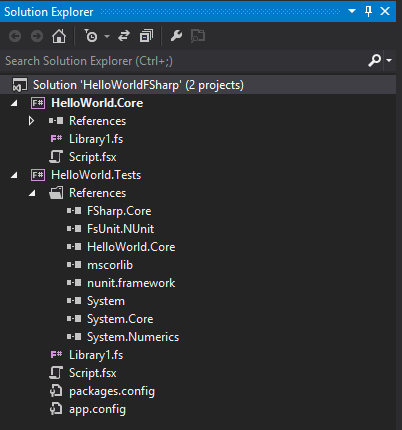I’ve just started playing around with F#, and I wanted to test some of my code. Here’s an introduction to the absolute basics of getting up and running.
Setting up a test project
So to get started I’ve set up a HelloWorld.sln which contains two projects. The first is my F# library, HelloWorld.Core, that contains the logic I want to test. The second is another F# library, HelloWorld.Tests, which amazingly enough will hold my tests. In the test project I’ve referenced the HelloWorld.Core project we’re testing, and installed the FsUnit package from NuGet, which installs both NUnit and FsUnit (which provides a more F#ish style of assertions).

HelloWorld.Core, NUnit and FsUnitSome code to test
Let’s open up the default Library1.fs file in the HelloWorld.Core project. We’ll add a Hello module with a SayHello function that takes a name and returns a string.
namespace HelloWorld.Core
module Hello =
let SayHello name = "Hello"
Setting up a test file
We’ll flick over to our HelloWorld.Test project now, and open up its Library1.fs file. Let’s replace the default namespace declaration with a module declaration, and import the HelloWorld.Core.Hello, NUnit.Framework and FsUnit namespaces using the open keyword:
module HelloWorld.Tests.Hello
open HelloWorld.Core.Hello
open NUnit.Framework
open FsUnit
We’re now ready to start writing some tests.
Testing F#
There seems a couple of things we need to do to make sure our test is picked up by NUnit (both via the NUnit and ReSharper runners). First, we need a function of type unit -> unit (we’ll get to this in a minute), and second, we need to decorate that function with a [<Test>] attribute (the equivalent of [Test] in C#):
[<Test>]
let shouldSayHello () = Assert.AreEqual("Hello World!", SayHello "World")
Here shouldSayHello is the name of our test, and we’re asserting that our SayHello function returns "Hello World!" when passed the name "World".
Note that we need to put the () after the test name. This forces the type of our shouldSayHello function to be unit -> unit, which is necessary for NUnit to pick up the test. Omit that and our test won’t appear in our test runner at all, without any hint of an error.
The unit type is pretty similar to void in C#, except we can actually create an instance of unit by typing an empty pair of parentheses: (). So unit -> unit means a function which takes () and returns ().
There are a few different ways of writing this, such as the alternative below. Use whatever style you prefer.
[<Test>]
let shouldSayHello2
= fun () -> Assert.AreEqual("Hello World!", SayHello "World")
Running our test
I run the tests by telling ReSharper to run all the tests in the solution. The NUnit runner also works. I haven’t figured out how to run just one test via ReSharper.
If we compile and run either (or both) of these tests, we see them fail as they are expecting "Hello World!", but we’ve hard coded our function to return "Hello". We can fix this by updating our SayHello function in HelloWorld.Core:
module Hello =
let SayHello name = "Hello " + name + "!"
F#ish assertions
The FsUnit package we installed at the beginning gives us a more F#ish way of expression assertions, compared with NUnit’s standard Assert.Something(...) syntax.
[<Test>]
let shouldSayHelloWithFsUnit ()
= SayHello "World" |> should equal "Hello World!"
Here we call SayHello "World", and pipe the output to the should equal "Hello World!" function using the |> operator. This works just the same as our previous test, but looks more F#ish and reads a bit more nicely.
FsUnit has a few different assertions, as listed in the readme on GitHub.
Quoted identifiers for extra niceness
The last thing we can do to make our test nicer to read is to use quoted identifiers which let us use a sentence for the name of our test function.
[<Test>]
let ``should say hello`` ()
= SayHello "World" |> should equal "Hello World!"
The double backticks let us use spaces in the name of our function for extra readability. They show up nicely in test runners too!

To testfinity, and beyond!
And so ends my first, tentative steps into testing F# code using F#. This has been enough to get me started, but the next stop is FsCheck for QuickCheck-style property testing.